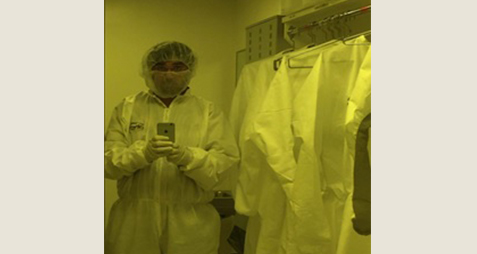
Dr. Abhijeet Gujrati (Goa, ‘12) is a Material Scientist and a Principal Engineer at Taiwan Semiconductor Manufacturing Company (TSMC). Having done his Bachelor’s in Mechanical Engineering, he pursued his MS and Ph.D. (Mechanical Engineering) from the University of Pittsburgh. He recently shared anecdotes from his career and life at BITS, providing valuable insights into his journey.
What was your prime motive for pursuing Material Science and Mechanical Engineering? How did your time at BITS shape this decision?
There’s a considerable intersection between Material Science and Mechanical Engineering. I pursued Mechanical Engineering because I was interested in cars and wanted to become an automotive engineer. At BITS, I found out that a lot of innovation has already been done on thermodynamics and fluid dynamics, but not a lot on materials. So that got me interested in material properties. That’s how it started for me. When you look back to see the steps you took to reach a place, you realize that they’re mostly random steps that just bring you to the place you are.
Can you give an overview of your work as a Principal Engineer at TSMC? Perhaps a project that you worked on that you found particularly exciting. What were some of the challenges you faced?
My role as a Principal Engineer is much more synonymous with Process Engineering here at TSMC. Process Engineers are responsible for optimizing and running manufacturing processes smoothly. As a Principal Engineer, I am also responsible for managing and leading teams. My primary focus is to ensure the smooth and quick progression of wafers through layers in the semiconductor manufacturing process, making sure we hit certain key productivity indices (KPIs). The biggest challenge is always the time crunch and the pressure of continuous improvisations.

TSMC is the leading player in the semiconductor manufacturing industry. What are some developments or areas of growth in Material Science and Engineering in the coming years?
As a pure-play foundry, TSMC focuses on manufacturing chips rather than designing them. Companies, like Apple, AMD, and Intel design their own chips that are manufactured by companies such as TSMC. As far as the semiconductor industry goes, the biggest innovation that is happening right now is things are getting smaller. With Moore's law reaching its limits in terms of scaling down transistor size, we have to explore new avenues. So what is left now is quantum computing. And quantum computing does exist. IBM has made quantum computers, but we don't have quantum chips, which I think is where we are going to go forward because we don't have any more space left.
What are some differences you felt working as a Researcher at a University in contrast to working for a large corporation like TSMC?
In research, I did everything from start to finish since it was my own project, while at TSMC, I'm in charge of a part of the process, and need to answer to many people and follow a stricter schedule. In academia, you work at the very edge of the Science of what is possible, while in the Industry, if you are not in R&D, then you are working with much more established procedures. Additionally, academia has a lot of freedom as to what you can do, what you can research on and how to approach it. However, there's a lot of pressure in academia for publications. There's a saying here: publish or perish. So, you have to keep producing results and keep publishing papers.
So what was it like to have your first paper published?
Relief. Relief, actually. It took me around three years to get my first paper published. Experimenting, analyzing results, going from journal to journal, dealing with rejections, and formatting, to finally getting published.
Now, looking back, one feels really good.
You Might Also Like
- BITS to Baker Hughes: Shad Hussain’s Journey Through Turbulent Times
- Be Cool: Navigating Life, Literature, and Mental Health with Shashi Warrier
- Coaching Across Cultures: Brajesh Bajpai’s Journey of Learning, Leading, and Adapting
- From Engineer to AI Leader: An Interview with Akhil Singhal on Startups, Strategy, and the Future of Gen A
- From Circuits to Capital Markets: Deepak Joshi’s Global Finance Journey














